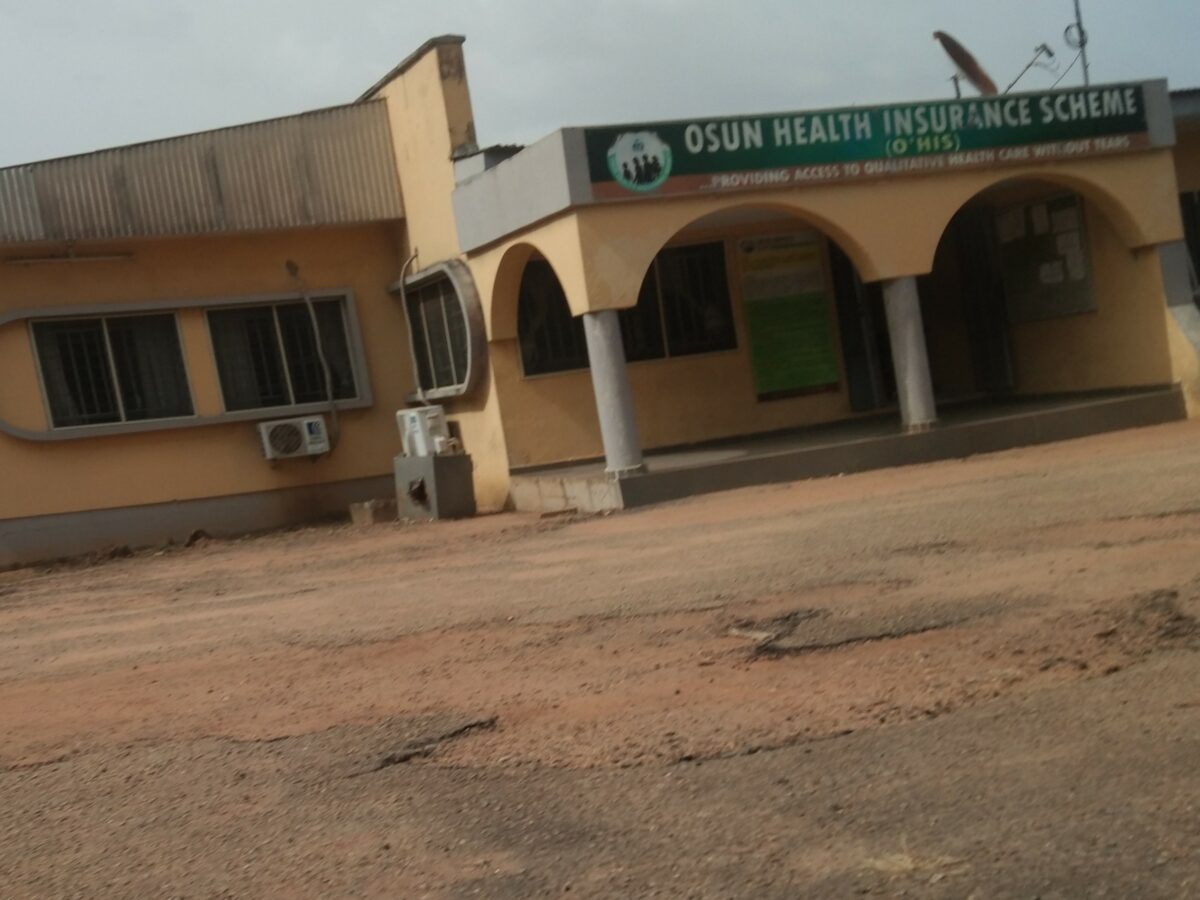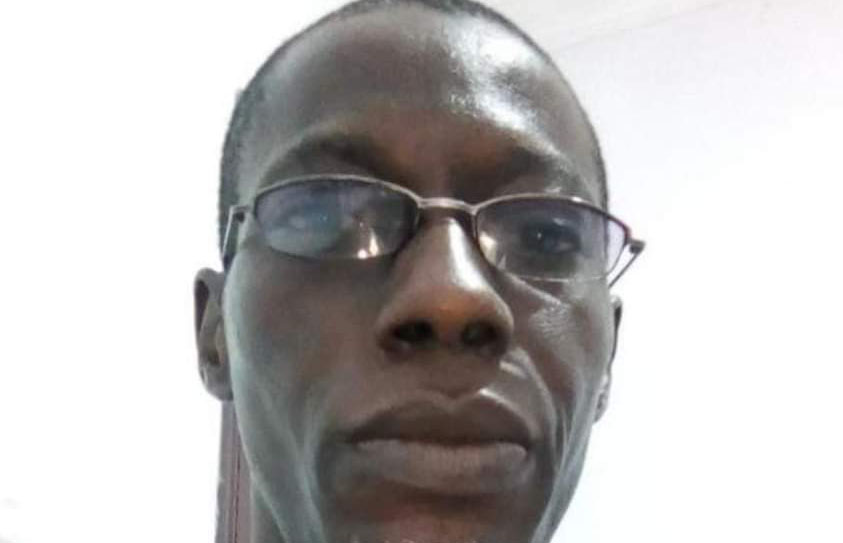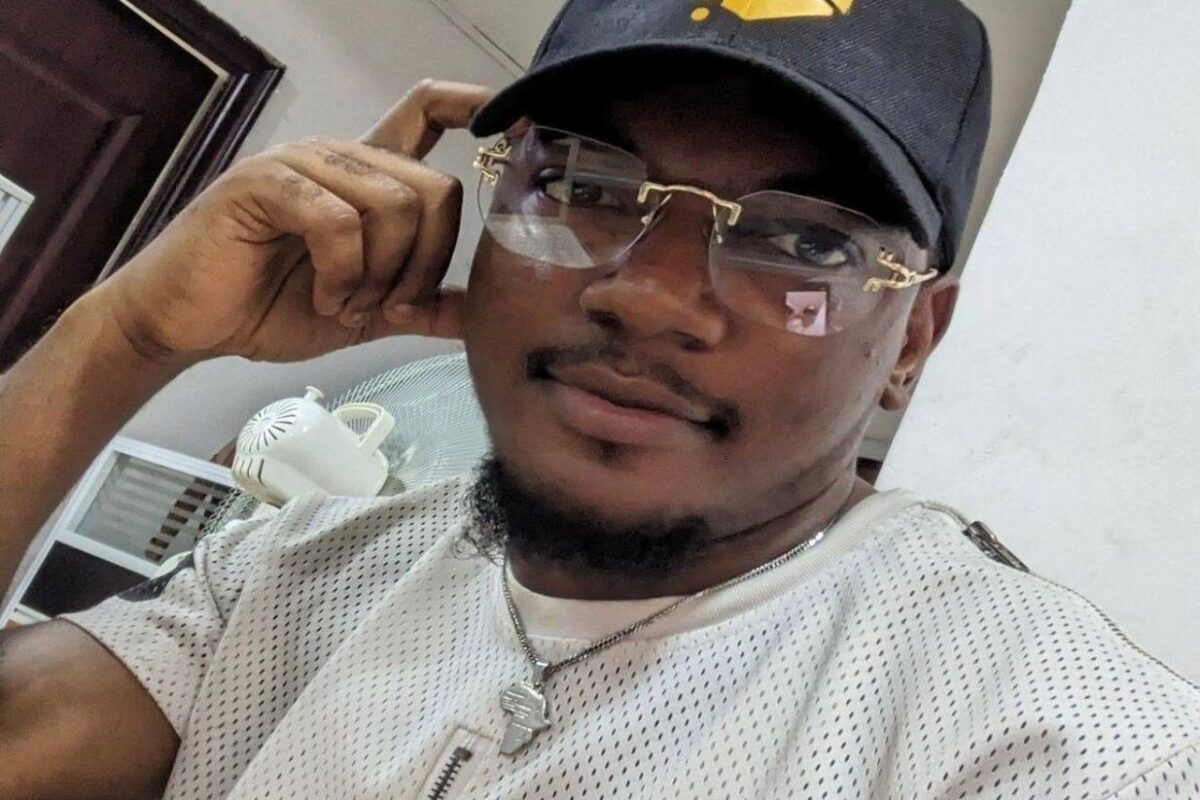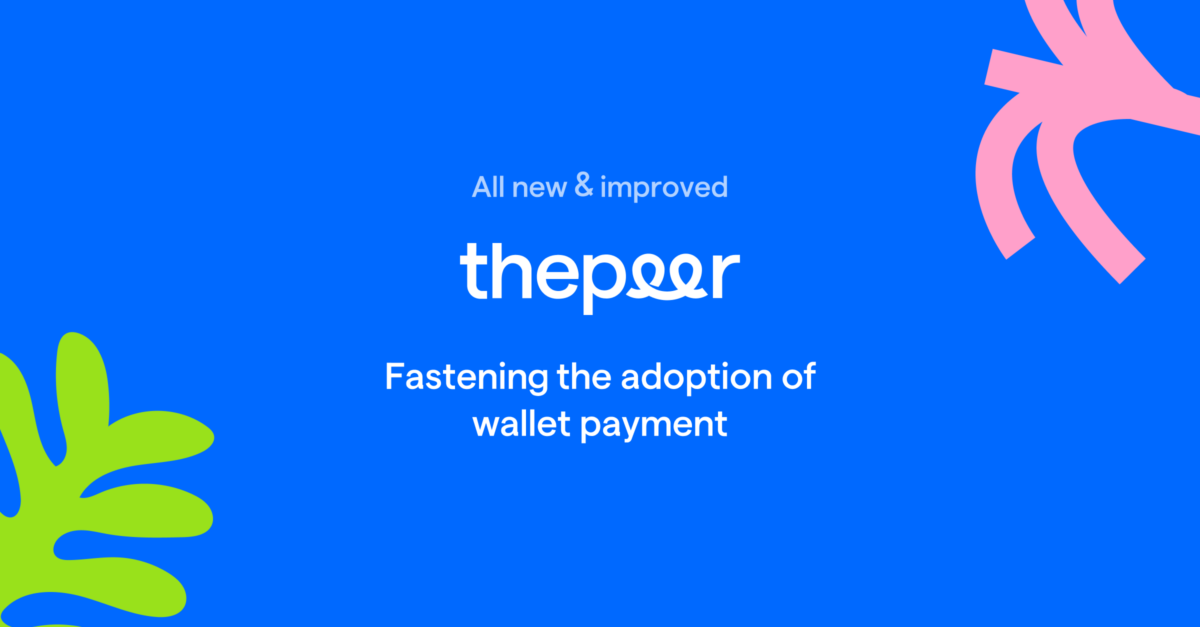“Because to take away a man’s freedom of choice, even his freedom to make the wrong choice, is to manipulate him as though he were a puppet and not a person.” ― Madeline L’Engle
To have freedom of choice or not to have freedom of choice, this is the question. The fundamental rights entrenched in the Nigerian constitution give citizens some freedom. But the essence of freedom lies in the right to decide our own path and make choices that suit us.
Section 35 (1) of the 1999 constitution says every person shall be entitled to his personal liberty and no person shall be deprived of such liberty save in few cases and in accordance with a procedure permitted by law.
A lawyer, who wants to be identified as Nick, told FIJ that the right of Nigerians to personal liberty can also relate to the freedom to choose whether or not to use healthcare services, except in cases of contagious diseases or a mental illness, where a court order can compel treatment.
But what happens if you have no say on the kinds of services you receive from the government? How do you feel if you are bound by law to have a portion of your salary deducted every month for a service you never use?
READ ALSO: PHOTOS: Pensioner Collapses During Screening Exercise in Osun
Imagine you are a government worker enrolled under the health insurance scheme in your state and the government deducts a small percentage of your salary every month as health insurance fee.
Let’s say you prefer your family doctor whom you’ve known for more than 10 years, way before the insurance scheme saw the light of day in your state. Your long-term family doctor’s health facility is excluded from the list of approved hospitals. You want to have freedom of choice, but the government’s body language says otherwise.
So, you decide to dump your insurance card somewhere since your preferred hospital is excluded. You have never used the health insurance close to three or four years, yet the government keeps deducting the fee from your salary.
Again, imagine that you, a state government worker automatically enrolled under the health insurance, are seriously ill. So, you pick your health insurance card and then proceed to the hospital (public or private) you are registered with.
You have no one to accompany you to the hospital, so you go there alone. But when you get there, one of the workers at the front desk tells you to search through the volume of cards in a big carton behind the reception hall. There are so many cards that it is hard to find yours.
You cannot but notice that patients not enrolled in the health insurance scheme get something akin to a preferential treatment. No one asks them to find their medical records by themselves; the workers in the reception hall do that for them. “Why is mine different?” You ask yourself.
Despite your health condition, you walk slowly to the wooden filing cabinet behind the front desk workers to rummage through the carton of scattered exercise books to get yours.
The booklets that contain your medical history at the hospital are not only messy but also arranged in a way that makes it difficult to find yours. If your name starts with the first letter of the English alphabet, there is no assurance that you will get it before the name that starts with ‘Z’. You have to keep picking up and putting down books until you find yours.


All the books inside the carton in front of you belong to other government workers equally covered by the health insurance scheme. Again, you cannot but help notice the bundle of files well-arranged on the shelves (not scattered in cartons). They most likely belong to regular patients of the hospital who are not covered by the health insurance.
For the second time, you ask yourself, ‘Why is mine different?’
About 10 minutes of dedicated searching have passed. You’ve found your medical record, which you take to the receptionist, who asks you to join the other patients in a narrow passageway to wait your turn for the nurse. Yes, a nurse will attend to you eventually, not a doctor, because, according to one of the receptionists’ idle remark, you are just a patient under the state government health insurance scheme.
WHAT OHIS ENTAILS
Osun Health Insurance Scheme (OHIS) was introduced in 2018 during the administration of the then Governor Rauf Aregbesola to reduce out-of-pocket payments and improve access to quality healthcare services for all residents of the state.
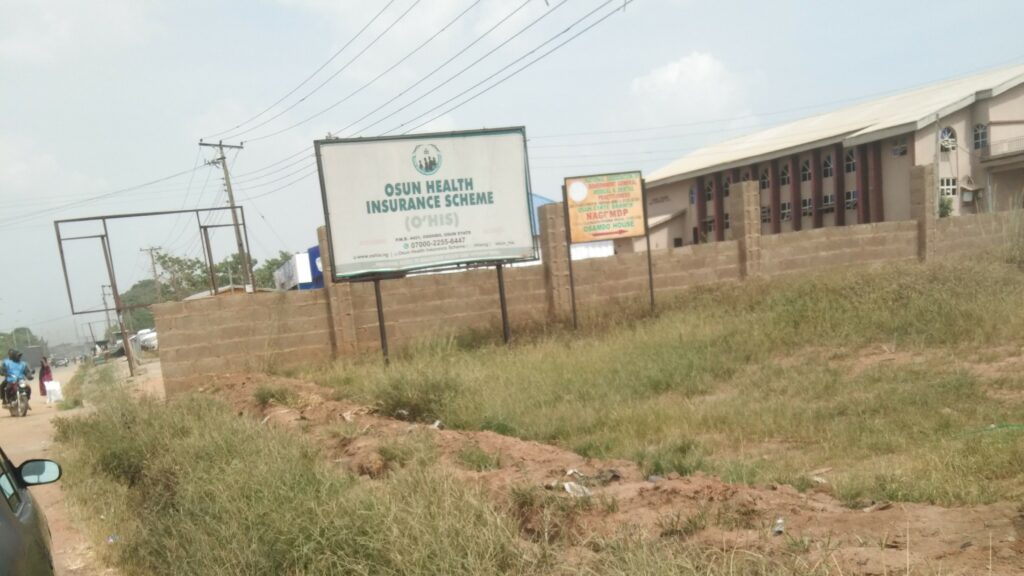
Some of its objectives were ensuring that all residents (both government and non-government workers) had ready access to effective, quality and affordable healthcare services and to ensure efficiency in healthcare delivery. But FIJ gathered that the scheme has fallen short of some of its goals.
FIJ gathered that while the government automatically deducts 1.5 percent of workers’ basic salaries as an insurance fee, they still have to register with the agency that oversees the scheme before they can get care. For non-government workers, they can enrol by subscribing to either the family package at N52, 600 or the individual package at N12,600 annually.
Registration for government workers entails providing biodata, choosing a preferred hospital among the list of approved hospitals and entering the names of your spouse and four children below 18 years (they can equally benefit from the insurance package).
Also, those who receive treatment under the scheme are expected to pay 10 percent of the bill incurred at the hospital. This means that if the hospital care you received costs N10,000, you are required to pay N1000.
WORKERS LAMENT POOR TREATMENT
Despite its lofty goals, the health scheme still faces a number of challenges, leaving some government workers lamenting poor treatment and enforced payments for services they don’t use.
In November, our reporter accompanied some of the enrollees to their respective hospitals in Victory Hospital in Iwo and State Specialist Hospital, Asubiaro, Osogbo, to identify some of the problems bedevilling the health scheme.
Before Margaret Uloma (not real name), an Osun-based civil servant, and our reporter left for Victory Hospital in Iwo, she disclosed that it had been months since she last stepped into the hospital.
One of her reasons was the subtle contempt and disdain she perceived from the hospital staff towards OHIS patients.
“I have been reluctant to go to the hospital. The nonchalant attitude of the health officials towards those of us under OHIS is really discouraging,” Uloma told me.
True to her words, when we got to the hospital, the attitude of the hospital was condescending to the OHIS patients. A Lagos-based nurse told me that under no circumstances are patients meant to look for their medical records by themselves. But this was not the case at Victory Hospital when we got there.
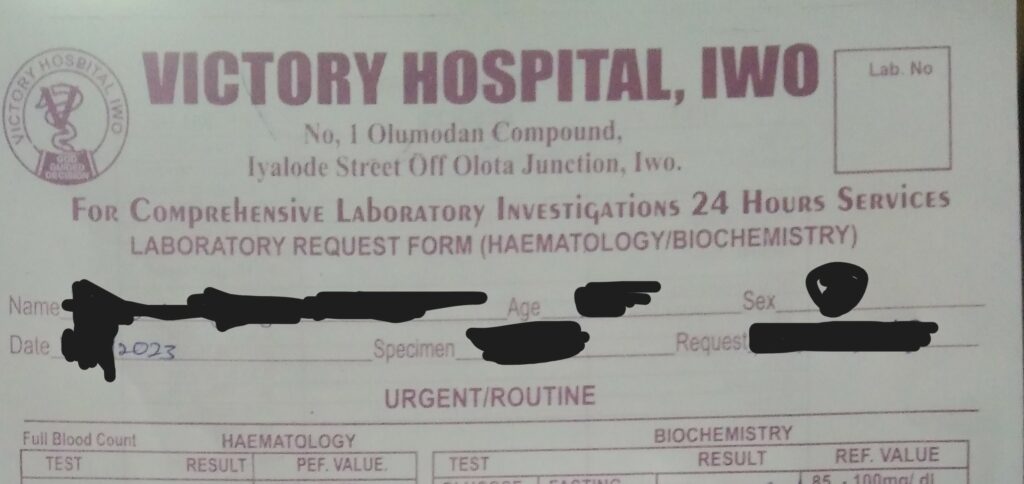
As soon as we entered the hospital’s cramped reception hall, one of the workers on duty just directed Uloma to the cubicle housing medical records of patients.
When I asked Uloma why this was so, she said, “That’s how they treat those of us that use OHIS here. This is why I hate coming here.”
‘NO ORIENTATION, WE ARE TREATED LIKE BEGGARS’
Mba Mara (real name withheld), another civil servant who shared the same sentiment with Uloma, told FIJ that a private hospital is supposed to take care of people “but the workers at these hospitals exhibit an I-don’t-care attitude towards us”.
“They tend to abandon patients instead of doing the required documentation and care. Sometimes, some workers from OHIS even treat us like beggars,” she told FIJ.
According to Mara, when the insurance scheme was first introduced, there was no orientation for potential users. She also said even before enrollees registered with Osun Health Insurance Agency (OSHIA), the agency in charge of the scheme, the government had been deducting the fee.
When asked if she had any document from the agency detailing the health care services covered under the scheme, her incredulous expression gave a negative answer.
“When the government wanted to start OHIS, there was no orientation. Even when I enrolled, no orientation or proper documentation was done. They just told us there’s something called OHIS. Only a few questions were even asked regarding any illness we wanted to treat,” Mara said.
Although she commended the health initiative, she was of the opinion that it could be better. She said she was shocked to find out that the healthcare plan did not cover a surgery she needed to do earlier this year and there was no available document she could have checked to be sure.
“When there’s a necessity to do an operation, they respond by telling us that they would need to write to inform the government of Osun State before any action can be taken. Sometimes, it requires a month, which later lengthens to six months or a year and the patient would leave the place to another hospital,” she said.
“I had a swollen side like a lump, which I was told required surgery. I was ready to do the surgery, but I was told they needed to inform the government and if they were permitted, they would do the surgery. I called the doctor for updates for months, but there was no response. I had to go to another hospital to get the surgery done.”
Mara also said she noticed that the health scheme could only cover certain minor illnesses. She said a doctor had told her that a hepatitis B test she wanted to conduct was not covered under OHIS.
FIJ’s check through the OHIS benefit package on the agency’s website showed that hepatitis B and C viral load, as well as treatment of hepatitis B or C with direct-acting antivirals or interferon are totally excluded.
“I went to a hospital with OHIS here in Iwo. When I told the doctor I wanted to conduct a hepatitis B test, he said he could not do it unless I was referred by him, and that OHIS would not cover the bills. They often say the scheme doesn’t cover the bills,” said Mara.
READ ALSO: Osun Mega School Aregbesola Built With N2b Is Fading Away in the Bush
‘THEY FORCED IT ON US’
One of the workers, who does not want to be named, said she had never used the health insurance because she had a family doctor who had been giving her family medical care for years.
“The doctor knows our medical history and all. And it’s really hard moving to someone or somewhere new,” she said.
“Also, there have been many complaints from those who even use the hospital I am registered with in Iwo. If you are not delayed, your attempt to get care will be frustrated. As the government is deducting my money, they are indirectly taking away any illness or disease that could affect me.”
Another enrollee in Osogbo, whose name is also withheld, said the government forced the health scheme on workers.
“I did the health insurance, but I have never used it, yet the government deducts a percentage of our salaries every month. Even if it is N50 per month, it is still wrong,” he told FIJ.
“This thing should be voluntary. If you are interested, you enrol, and then the government can start deducting the money. And if you are not interested, the government should respect your decision.”
Many of the workers indicated that the health scheme ought to be voluntary, thus giving individuals the freedom to decide whether to enrol or not. But the automatic deductions from their salaries undermine their freedom of choice.
FIJ understands that at the federal level, the National Health Insurance Act 2022 empowers the National Health Insurance Authority (NHIA) to ensure that health insurance is mandatory for every Nigerian and legal resident. The act also directs the enforcement of “the basic minimum package of health services across all health insurance schemes operating within the country, including federal [sic], states, and the Federal Capital Territory (FCT), as well as private health insurance schemes.”
Some government workers interviewed in Osun asked why the health insurance scheme has to be mandatory, especially when their preferred hospitals are not approved. While the inability to cover expensive medical care during financial hardship is a major downside of not having health insurance, an Investopedia article highlights the primary benefit of non-mandatory coverage: the money saved on insurance payments remains in your pocket.
An article by Michael F. Cannon, the director of health policy studies at the Cato Institute, an American public policy based on individual liberty, limited government and free markets, also suggests that individuals should be responsible for their own health insurance decisions and should not be forced to purchase it.
‘NO DOCTOR TO ATTEND TO ME FOR ABOUT A WEEK’
“People claimed that Iwo Medical Centre was much better, but my experience there sometimes in May showed otherwise. I remember taking my sick child there because the insurance scheme is supposed to cover family healthcare, but they said my child’s name wasn’t on their list. I then had to pay for her full treatment myself. This was despite including our spouse and children’s names during registration.”
Those were the words of Garba Adaobi (real name withheld), another enrollee who switched from the government-owned hospital in Iwo due to reports about a shortage of staff and a lack of doctors.
“I was previously enrolled in the general hospital, but they told me there were no officials and I would need to pick another hospital. If you go there, you won’t get a doctor to attend to you. It’s just one doctor who will serve many patients. In fact, it was a waste of time going there. For those who managed to get a doctor to attend to them, they were faced with unavailable drugs. They would just prescribe the drugs and tell you to get them yourself. That was why I changed to Iwo Medical,” Adaobi told FIJ.
But Adaobi stated that the situation wasn’t much better even at the new hospital because it was equally difficult to get a doctor to attend to patients.
“You won’t meet a doctor at Iwo Medical too. Only a matron nurse will attend to you. I went there for a whole week, yet no doctor attended to us. It was just the nurse. They seem to treat those who initially registered with them better than those of us who transferred there.”
Although another worker held that her relative who is enrolled at Iwo Medical Centre had not reported any complaints, our reporter observed that doctors were also not enough in Victory Hospital.
For the period our reporter accompanied Uloma to Victory Hospital, it was a nurse and a laboratory attendant who attended to her. In fact, when someone asked if she wanted to see a doctor, a remark by another hospital staff member revealed that nurses, not doctors, attend to OHIS enrollees.
“Isn’t she under OHIS? They always see the nurse,” she said.
‘THEY DON’T GIVE EXPENSIVE DRUGS’
Some of the workers also revealed that they found that hospitals would not give out certain drugs deemed expensive. From what our reporter gathered, what is considered expensive in one hospital may not be the same in another
Adaobi’s said she was told at Iwo Medical Centre that OHIS did not cover a particular drug that was only worth N750.
“They won’t give you expensive drugs. I had to buy a very essential drug from another pharmacy because, according to them, my health insurance did not cover it. This was a drug that was N750 at the time. It just increased to about N1,100. How is it possible that the scheme cannot cover a drug like that? Since then, I haven’t gone back there,” she said.
Another enrollee in Osogbo, who prefers to be identified as Pat, said while she had no complaint about the scheme, she had found that the private hospital she uses does not give expensive medication or run expensive tests.
“I don’t think I have any complaints except for a day when I took one of my children to the hospital and I was notified that she was not covered for the test she was supposed to run because it was an expensive one. From what I’ve noticed so far, the hospital does not give expensive medications or run expensive tests,” she said.
Pat explained that medications from N5,000 above and tests that cost N10,000 upwards are deemed expensive.
“For such expensive medication, the hospital will tell you that it is not available. They are simply telling you to get it outside the hospital. But on a general basis, the health scheme has been okay.”
FOOT-DRAGGING AT HOSPITALS FUEL FRUSTRATIONS
At Victory Hospital in Iwo, Uloma received medications and was discharged within an hour and thirty minutes, but the experience at Asubiaro Specialist Hospital in Osogbo was quite different. The lack of urgency on the part of health officials at the hospital frustrated her.
Imma Emma (not real name) and I got there before 9:00 am but we did not leave until 12:33 pm. FIJ learned that she had abandoned the hospital since 2021 because of her unpleasant experiences there.
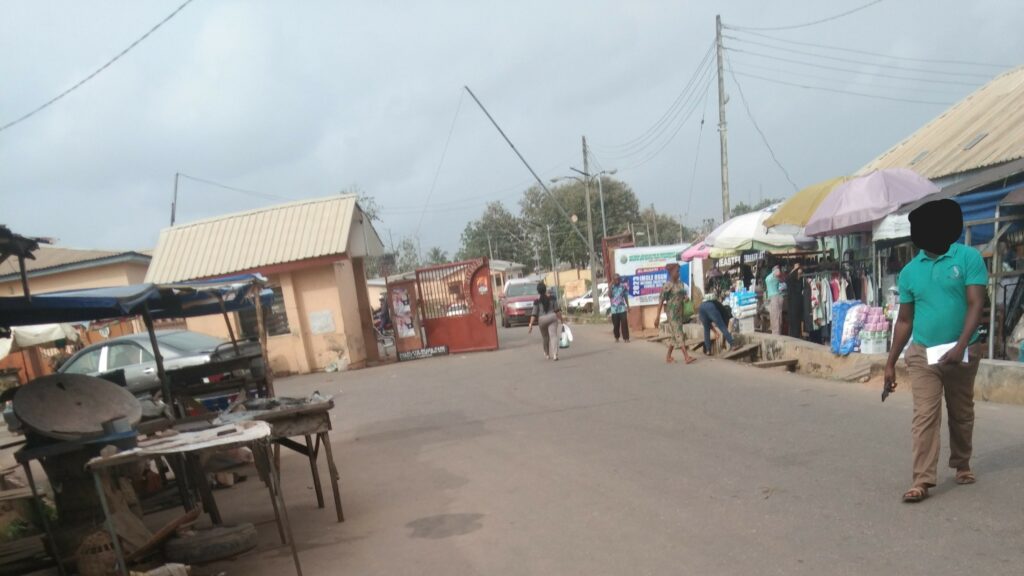
Emma would later tell our reporter that the response rate was way better compared to her previous visit, when she was delayed before she could see a doctor.
“I got there long before 8:00 am that time, and we did not get a doctor to attend to us until after 2:00 pm. In fact, when the doctor came, he was in a hurry, telling us that he had another appointment. I was seriously ill at the time. I even regretted going there then. But it seems they have improved,” she told FIJ.
“If you just walked in around 11:00 am or later in 2021, they might tell you they didn’t have the time to start looking for your card. If you came by noon, no doctor would attend to you.”
In spite of the improvement, this visit was still marred by complaints and frustrations from other health insurance enrollees, some of whom arrived before us.
First, it took more than 30 minutes before those at the reception hall could find Emma’s medical record in their cabinet. This was despite providing them with her enrollment number.
Unlike the hospital in Iwo where it was a nurse who attended to Uloma, there were at least three doctors attending to patients in Asubiaro that day.
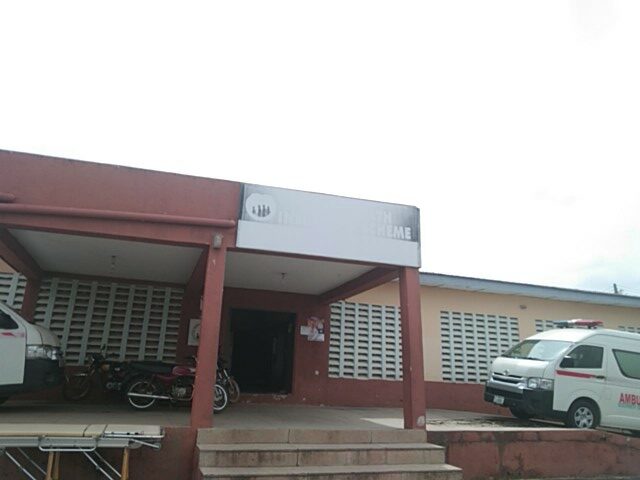
After the medical record of each patient was located, it was forwarded to a doctor’s office. The moment Emma’s medical record was found, she was notified that she could see the doctor. But this would be another long wait until one of those waiting to see a doctor registered his displeasure at the delay.
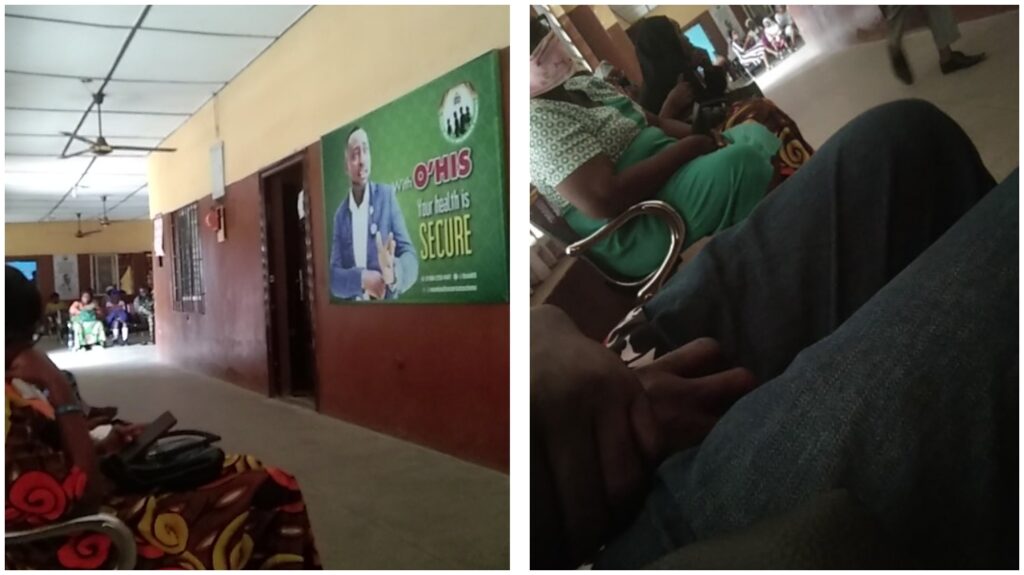
Our reporter observed that rather than attending to the OHIS enrollees in the order of which they arrived, the names of some who arrived much later were called before the early comers.
There were complaints and grumblings from several people, with many of them wondering why a person who came after them would see the doctor before they did. Some even traced it to the culture of favouritism and nepotism that is prevalent in the country.
One elderly woman was infuriated by the seemingly lack of care and urgency with which the hospital staff members attended to patients.
“If this was an emergency, people would definitely die here. You can’t have an emergency and come here. You will just die,” she said.
REPORTER’S DIARY: Trying to Know How Lagos Beggars Would Vote, I Encountered ‘Area Boys’
FEAR OF BACKLASH STOPS WORKERS FROM REPORTING UNPLEASANT EXPERIENCES
In the course of my conversation with these government workers, I could sense a disconnect between them and the government. They don’t know who exactly to complain to, so they keep quiet. Their timidity comes from a place of fear of losing their jobs. They believe the government that employed them can terminate their appointments anytime and they won’t be able to do anything about it. So they would rather grumble than speak out.
Beyond the fear communicated by their eyes, they made a few comments about it.
“Who do we see? Who do we want to report to? Please, don’t mention my name. We don’t have any other job except this government work. We don’t want anyone coming for our heads,” Mara told me.
Meanwhile, beyond these unpleasant experiences, a government worker in Gbongan, Ayedaade Local Government Area (LGA) of the state, told FIJ that the health scheme had been a blessing in disguise to him.
“I have been using it for more than three years, and the benefits are numerous. For instance, at the hospital, I only pay 10 percent of the total cost of care,” he told FIJ.
“While I have no issues with the hospital I use because it’s been smooth so far, some other people are facing challenges in theirs. Some people have complained about poor healthcare and unavailability of drugs. I use the government hospital, and most of those who have complaints are the ones using private hospitals.”
O’HIS RESPONSE
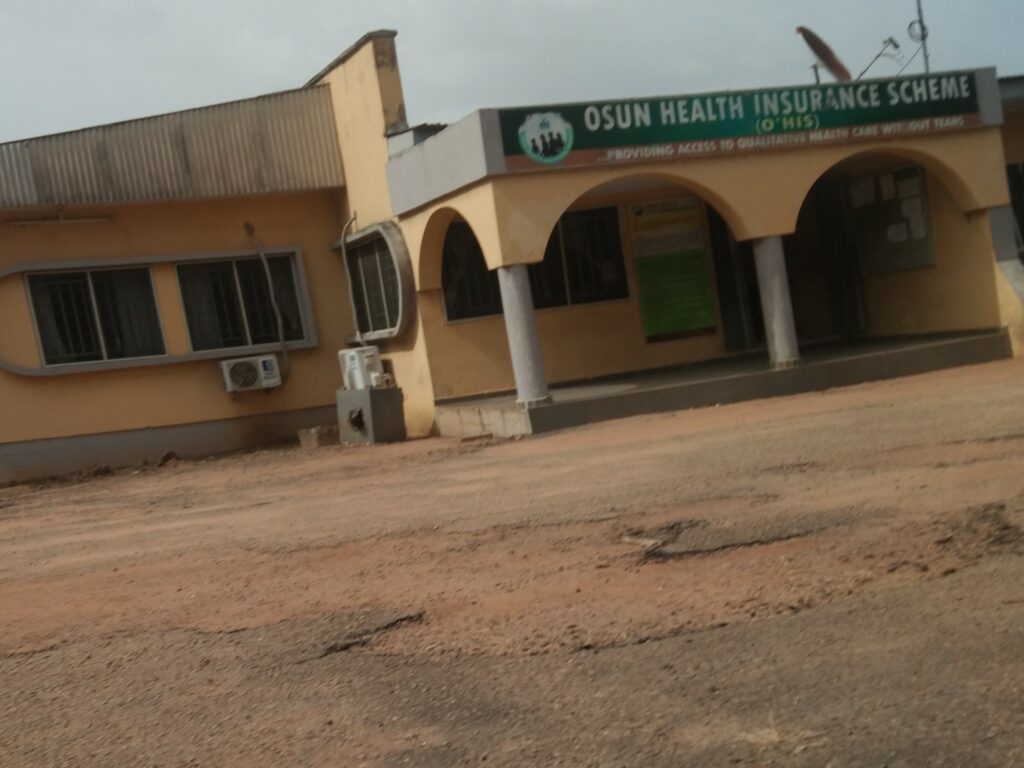
Dr Shina Igbalaye, the director of Standard and Quality Assurance (SQA) for the health insurance agency in Osun, told FIJ that the health insurance was not just for government workers in Osun but for all residents. He said it was in tandem with the law at the national level, which makes it mandatory for every Nigerian.
He said that “though civil servants’ deduction is being made into our account, they still have to go through the normal registration processing”.
The fact that you are a civil servant does not make it automatic. The health insurance for the civil servant covers the principal, who can either be the father or the mother, their spouse and four biological children below the age of 18.
“In fact, what is being deducted in Osun State is the least across all the states of the federation, which is 1.5 percent their basic salaries, not the entire salary. The government also pays three percent as the employer’s contribution.”
He also mentioned that the health insurance is a pool of fund based on the principle of social solidarity.
“It is a pool of fund where the healthy will pay for the sick and the rich will pay for the poor. For example, I have never had to use it, and they keep deducting my money because I believe somebody somewhere is using that money for his or her own health benefit,” Dr Igbalaye disclosed.
In response to claims that deductions were made before workers began registration, he said it started after the law was passed in the state in 2018 and discussions with labour leaders concluded.
“About some enrollees saying they weren’t informed about what the scheme covers, that’s not true. We have flyers, benefit packages, by-laws and regular sensitisation programmes to inform enrollees.
“We also have a multi-layered approach. We have a 24/7 call center, active social media handles and business officers in every local government who conduct regular quality inspections. We also conduct monthly and quarterly spot checks with agency staff and even myself.
“We have always encouraged reports through the call center, social media, direct contact at our office or written letters. We take all complaints seriously and investigate them. We have even delisted two hospitals for violation of procedures and refunded enrollees who were extorted.”
INSURANCE BROKER’S VIEW
A Lagos-based insurance broker, who does not want to be named, told FIJ that insurance is like a pool of funds from which contributors benefit when they experience covered events.
“It is just like the ancient informal cooperative savings culture known as ‘ajo’ in Yoruba. In the context of health insurance, health cover will be accrued to any member in the event of incidents.
“As for some of their workers having to patronise an existing hospital apart from the ones prescribed under their scheme, I think this matter can be sorted out through dialogue with the active participation of workers unions.
“I don’t know whether the state I reside in made it compulsory for its workforce, but since he who plays the piper dictates the tune, the workers in Osun will just have to fall in line by picking one from the pack of hospitals.”
This story was produced with support from the Wole Soyinka Centre for Investigative Journalism (WSCIJ) under the Collaborative Media Engagement for Development Inclusivity and Accountability project (CMEDIA) funded by the MacArthur Foundation
Subscribe
Be the first to receive special investigative reports and features in your inbox.


